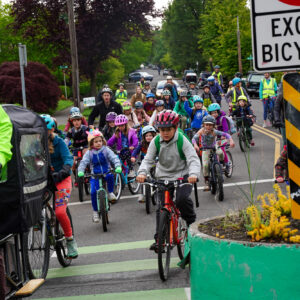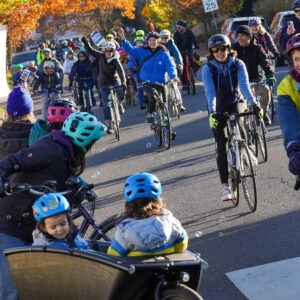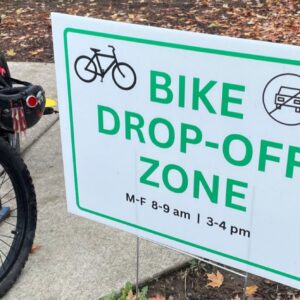
When it comes to local bike trends, one of the things I’m looking forward to is how the bike bus phenomenon plays out in the coming months and years. Will these mass group rides to schools eventually fizzle out like “bike trains” of yesteryear did? Or will they continue to swell and become as ubiquitous as yellow school buses? And beyond bike buses themselves, will they have an impact on bicycling and safe streets advocacy more broadly?
As Portland’s bike buses evolve, we are beginning to get answers to questions like these.
When the Abernethy Elementary School bike bus went daily, organizers told me it had an immediate impact on how the community perceived the event. It was suddenly more accessible, more reliable, and inspired more engagement. Then on May 22nd, Portland Bureau of Transportation Director Millicent Williams and City Traffic Engineer Wendy Cawley joined them, a move that represents further evolution.

And turns out it wasn’t Director Williams’ first time on a bike bus. In a video posted by Alameda Elementary School bike bus leader Sam Balto to social media today, Williams said the bike bus, “Shows me what we need to do at the transportation bureau to make sure that every community that wants to do this, has the ability to do this safely and comfortably.”
And now the City of Portland’s transportation bureau wants to adopt the bike bus playbook for getting employees to work. The Portland Bureau of Transportation tried its first ever employee bike bus on May 1st (the first day of Bike Month) and it went so well, they plan to make it a regular thing.
According to PBOT Communications Director Hannah Schafer, the idea of an employee bike bus came from internal staff who felt it would be a fun way to build camaraderie during Bike Month. “They were inspired by all the amazing bike buses we’ve seen in Portland schools and wanted to try our own version,” Schafer shared with BikePortland last week.
Here’s how they did it…
Staff from PBOT’s communications and social media teams used internal newsletters and other channels to gauge interest. Staff were given a form that asked the general area they commute from and whether or not they’d be interested in being ride leaders. 45 employees responded to that initial survey — plenty to signal the initiative was worth pursuing.
Organizers then cross-referenced locations of employees who wanted to lead rides to come up with possible meeting spots and routes to the Portland Building on SW 4th and Madison. “The ride leaders were essential,” Schafer said. “They helped refine routes and made sure there would be a person waiting to greet riders and show them the way.”
Once the meeting places and routes were set, the event details were shared through the Bureau of Human Resources in a citywide newsletter sent to all 7,500 city employees.
On event day, staff met at six different locations and hopped onto unique routes that all led to Salmon Springs in Waterfront Park where they gathered for a group photo before rolling up SW Main to the Portland Building’s robust bike parking area. But before locking up for the day, Schafer made sure one element of the event was in place: free coffee and treats!
“Every bike bus had adventures to share,” Schafer recalled about the event. “The SE Belmont bike bus coincided with the Abernethy School bike bus, resulting in an epic, joyful moment at Ladds Circle that staff couldn’t stop talking about. The NE Woodlawn bike bus got cheers and waves from PBOT colleagues working on an ADA curb ramp along their route. The Woodlawn and University Park groups came together at Peace Park just before crossing the Steel Bridge and stopped for an impromptu group photo.”
Schafer also said that, during the ride some staff got to know more about colleagues and/or meet other city employees for the first time.
Over 40 city employees participated and Schafer said it was such a success they are now planning monthly bike buses through September. They will start a bit earlier (to make sure everyone gets to those early meetings on time!) and add more start locations to meet demand.
Schafer thinks PBOT’s approach could be a great model for other workplaces. “We can’t wait to see how our bike buses grow,” Schafer said.
The bike bus might end up being the most effective advocate for cycling in Portland. It’s one thing for city engineers and planners to hear from Portlanders at meetings, or experience streets on a site visit or while biking to work alone. But riding in a group can encourage a much deeper appreciation for the myriad social, mental, and physical benefits of cycling that transcend engineering calculations. This experience with human infrastructure could end up leading to more of the concrete kind.








Thanks for reading.
BikePortland has served this community with independent community journalism since 2005. We rely on subscriptions from readers like you to survive. Your financial support is vital in keeping this valuable resource alive and well.
Please subscribe today to strengthen and expand our work.
Biking somewhere by yourself is great, biking somewhere with a group of friends and colleagues is even better. My favorite part of riding these days tends to be when I have someone else there with me, and hope to see more momentum on this front in the future 🙂
I frequently see school bike bus groups where adults outnumber kids. These are not the PBOT groups. I think the bike community should welcome feedback on the lack of diversity and equity. The parents are white and affluent. I look at the quality of the bikes of the adults and kids. I’m guessing more than 80% of the adults work from home, don’t work, or have very flexible white collar jobs. I would like to hear them say they will focus their their energy on proving it works in diverse communities in Gresham and diverse schools in Portland. Right now it’s not a climate solution, it’s a white community with no equity.
Is your message directed at PBOT or the parents who are spending time organizing and riding with their kids to school? Who are you shaming here?
Why are we not reading how they most likely held up traffic causing the average tax payer to be late for work.
you think groups of 5-10 bike riders (40 converged at the final spot, Salmon springs) held up traffic? I bet you’re one of those people who doesn’t stop at cross walks because those pesky pedestrians are slowing down your car travel time!
If this is really successful think about how there are going to be fewer traffic jams at peak time as there’ll be fewer cars on the roads.
Good one, Rob. Since cars don’t “hold up traffic,” by your estimation, there’s no need for any further freeway expansion. Think of the billion$ we’ll save on the Rose Quarter project alone!
Wow! The comment section is so sour. This is really cool news and (I hope) a signal of things to come. Imma do a bike bus with my friends to the next Timbers/Thorns game I go to.
I wonder if we could establish a set of regular routes/timetable for soccer games. They already attract so many riders, who want to be a crowd- I bet if it were promoted/known it’d get pretty good ridership (maybe we can advertise it at the bike parking before the game, so people know for their next visit)
I prefer to bike alone, but for people who want the support of other cyclists, this bike bus is a great idea. Nice job, CoP employees.
Bike Buses are cool. Love the one for schookids!
The issue I have is they’re only promoted and happen in the more leafy, wealthy neighborhoods. My neighbohood is dangerous for kids on bikes–at least that’s how I feel for my kids. Too much speeding and lots of sketchy tent camps. Yet the people advocating for them don’t care about that it seems… enforcing our traffic laws/RV parking laws is not cool because “cops are bad” and keeping our city safe and clean from unsacntioned camping is not compassionate to the “vulnerable”. This approach needs to change before more of us can use Bike Buses (especially for our kids)
Bike busses provide safety in numbers and can make biking to schools safer for kids who live in more dangerous neighborhoods.
Bike Buses are volunteer-run local groups that are pulling more people into riding bikes and experiencing the impact of our environmentally, socially, and fiscally responsible policies of the last several decades. I don’t know, maybe the other parents on our Bike Bus think the way you say they do (though it’s not my experience). Is your idea that no one should ride to school, until everyone can ride to school? If so, I guess that seems reasonable, but, do you have a practical way to achieve that? Or a way these often otherwise-unengaged parents and kids could help achieve what you’re hoping for, that doesn’t involve riding to school?
There were many Vasquez signs in my leafy neighborhood this cycle. The winds are shifting and I think things will start getting better. Some of us are on your side.
It makes me so happy to read this!
The only thing more important for civic activation than getting parents on bikes is getting PBOT on bikes. This is one of the sleeper stories of 2024 and a very positive sign.